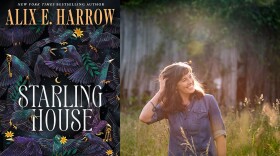New York Times bestselling author Alix E. Harrow has created fantastic stories with roots in tradition, but with wholly fresh takes. In her previous novels she’s written about doorways to other worlds, witches and a haunted mansion in the midst of dying Kentucky coal town.
But her new novel is like nothing I’ve read before.
The Everlasting (Tor, Oct. 28) is a genre-defying story that involves a legendary lady knight and a cowardly historian. Sir Una Everlasting was an orphaned girl who became a great knight, according to centuries of legends and stories. Owen Mallory is a struggling scholar who failed as a soldier. Given the centuries between them, they should never have met, but they do and find that they have the chance to rewrite history.
The Everlasting has knights and queens. And a quest. And time travel. The story made me think of how hard it is to discern the true stories behind our own real-life historical figures from the legends built around them through time. And of course, there is a great love story, too.
In a recent What We’re Reading conversation, Alix E. Harrow explained where her unique and deeply inventive stories come from.
“I think a lot of what the author Nicola Griffith, who's one of my favorite writers, said about inspiration--it's not a moment. She thinks of it more as a box and that you are always putting things in the box, whether you know it or not. And then eventually, something sort of amalgamates in there and what comes out is your inspiration.”
The Everlasting specifically was inspired by the “lady knight” or “girls with swords” books Alix read in her younger years. She cited books like Robin McKinley's The Blue Sword and The Hero and the Crown, Tamora Pierce’s “Song of the Lioness” series, and Sherwood Smith’s Crown Duel.
The common thread, according to Alix? “It's kind of a girl's coming-of-age narrative where she specifically studies or obtains this particularly violent power of some kind. Like she's a knight, she gets armor, she gets a sword. She becomes powerful in a really particular way that hit for me because it was definitely a gendered type of heroism that I felt was a little bit inaccessible to me that really fulfilled a specific dream of mine.”
The Everlasting also highlights the discrepancies between the legends of Sir Una and her actual lived life. Alix explained that our ideals of knighthood are tied to heroism and chivalry but in actuality knights were “private security for wealthy landowners.” These ideals and the romannce of traditional knight stories hide the true stories.
She said, “Because I do think I was intentionally mimicking real-world…examples of states or empires employing particular mythological histories to justify their present-day actions. Like what the British Empire did with the Arthurian myth cycle. Like what present day American fascists do with their need to control a specific vision of American history, right? Like they're telling a really particular narrative that will justify who's in power now, who's not in power, who belongs and who doesn't belong.”
At its core, The Everlasting is a love story. A fan of the romance genre, Alix had not written a story before where a romance was so central to the plot and relationship of her characters, and she found that writing the romance was no easy feat.
She explained, “I think we all have this slightly rude assumption in our heads that like, ‘Oh, you could just write a romance in there. You could just put in a love story.’ But it takes a lot of thought about making two people that have significant barriers to being together but also make sense and inevitably will come together.”
But Sir Una and Owen are not traditional love interests: Una with her bravery and physical strength; Owen with his “slim shoulders” and spectacles. Alix pointed out that there’s nothing wrong with traditional gender assumptions in straight romances, but she was telling a different story—a lady knight story.
“I really wanted to flip that a little bit in particular because I think that the idea of a lady knight inherently has some gender subversion to it.”
Learn more about The Everlasting and Alix E. Harrow’s other books on her website.
Looking for a good book recommendation? Want to recommend a book you've just read? Check out our What We're Reading page on Facebook, or text us at 218-326-1234.
What We're Reading is made possible in part by the Arts and Cultural Heritage Fund and the citizens of Minnesota.















